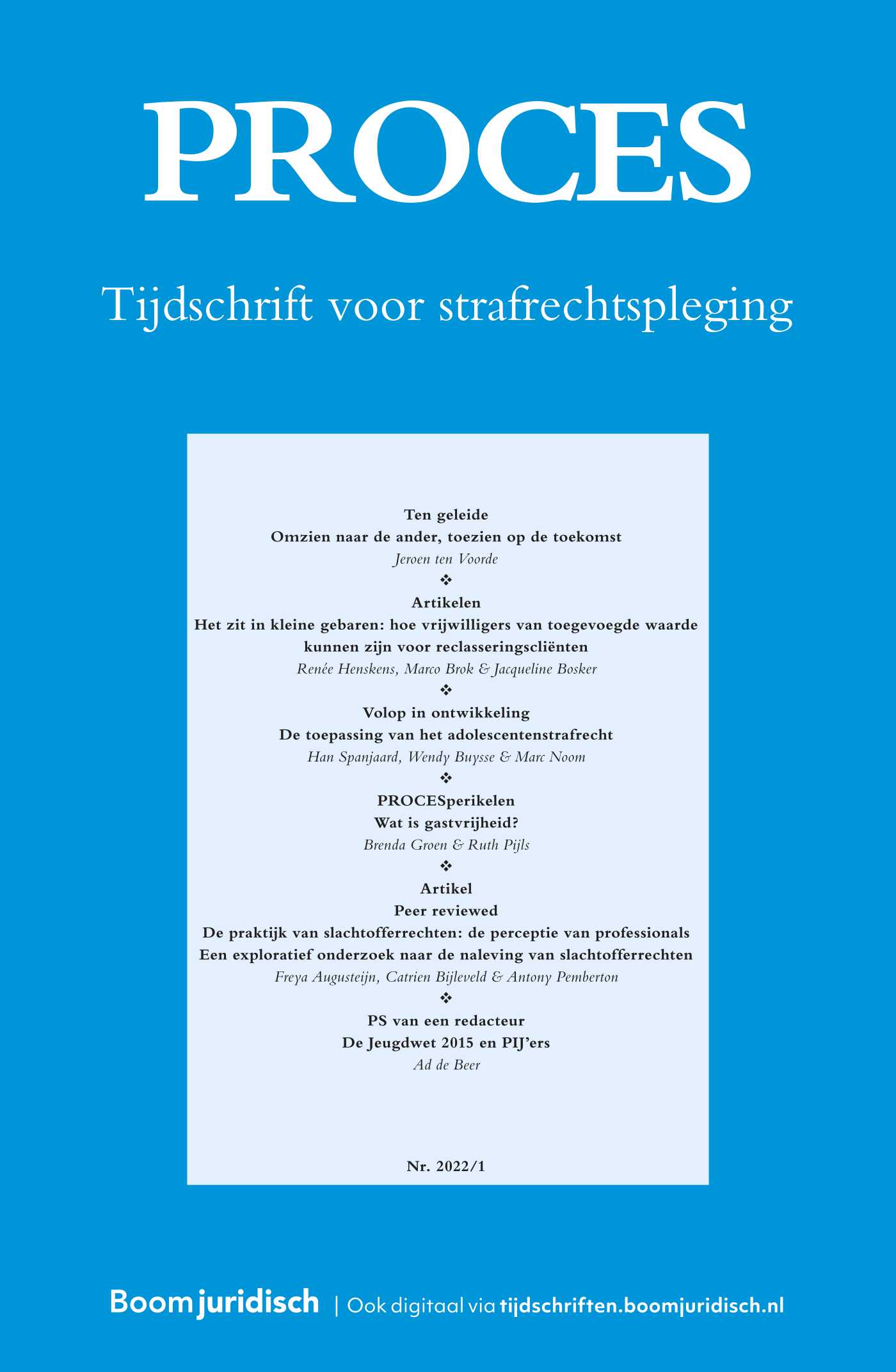|
This article discusses the relationship between science and professional practice from the presumption that the two need and reinforce each other. The distinction between theoretical and applied research is rather small and maybe even fictional. This is also true for research in the area of public safety. However, we deal with a very specific area of research here that sometimes requires specific requirements concerning publications and trust. |


PROCES
Meer op het gebied van Criminologie en veiligheid
Over dit tijdschriftMeld u zich hier aan voor de attendering op dit tijdschrift zodat u direct een mail ontvangt als er een nieuw digitaal nummer is verschenen en u de artikelen online kunt lezen.
| Redactioneel |
Mister Right of toch maar Mister Good Enough? |
| Auteurs | Janine Janssen |
| Auteursinformatie |
| Artikel |
Wetenschap en de beroepspraktijk: partners in veiligheidszorg |
| Trefwoorden | Wetenschappelijk onderzoek, Praktijkgericht onderzoek, Veiligheid, Valorisatie |
| Auteurs | Prof. dr. Emile Kolthoff |
| SamenvattingAuteursinformatie |
| Artikel |
Wetenschap, politiepraktijk en kennistransfer |
| Trefwoorden | Strategische onderzoeksagenda politie, Wetenschap, Kennistransfer, Politiepraktijk, Politieonderwijs |
| Auteurs | Drs. Henk Huisjes |
| SamenvattingAuteursinformatie |
|
This article discusses relations between social science, education, and professional practice, and focuses on the impact of scientific research on police profession. The importance of knowledge transfer is clearly articulated in the strategic research agenda of the Dutch police. Police researchers are expected not only to do proper and relevant practice oriented research on aspects of security and policing, but also to contribute to the impact of scientific knowledge on the education of (future) professionals. This asks for an association with teachers, since they are in a key position regarding further knowledge transfer. Compelling examples of other sectors, like healthcare, may inspire the police to rethink key roles of teachers in that respect. |
| Artikel |
Samen voor de jeugd: hoe wetenschap, onderwijs en praktijk samenwerken aan de preventie van seksueel misbruik in de residentiële jeugdzorg |
| Trefwoorden | Seksualiteit, Jeugdzorg, Preventie, Implementatie, co-creatie |
| Auteurs | Drs. Michelle Wismans, Drs. Anne Boer, Dr. Mechtild Höing e.a. |
| SamenvattingAuteursinformatie |
|
Young people in residential health care are experimenting with sexual behavior and sexual boundaries just like other young people do. But unlike youth in ‘normal’ circumstances, they often face an increased risk of becoming victims or perpetrators of sexual problematic behavior. Professionals often find it difficult to deal adequately with sexual behavior. The ‘Flag system’ is a method that helps them to assess sexual behavior adequately by applying six criteria, and rate satiation with four different ‘flags’ (green = normal behavior, yellow = risky behavior, red = mildly sexual abusive behavior, black = severely sexual abusive behavior). It provides guidelines to react in a way that supports normal behavior and addresses problematic behavior. A set of drawings illustrate situations that range from normal sexual behavior to severely abusive behavior, which can be used to discuss with young people or with colleagues. The original Flag system was developed by Sensoa, a Belgian experts center on sexuality. The original version was developed for use with children from 0 to 18, and therefore an adaptation was necessary to fit the needs of adolescents in residential youth care. |
| Praktijk |
De wereld van de wetenschapper en de wereld van de praktijk |
| Auteurs | Prof. dr. mr. Catrien Bijleveld |
| Auteursinformatie |
| Artikel |
De DJI en de wetenschapOver de wijze waarop een uitvoeringsorganisatie samenwerkt met de wetenschap |
| Trefwoorden | Kennismanagement, Kennisontwikkeling, Kennisbenutting, Samenwerking |
| Auteurs | Arie Van den Hurk en Annelies Jorna |
| SamenvattingAuteursinformatie |
|
The Custodial Institutions Agency (Dienst Justitiële Inrichtingen - DJI) is responsible for the incarceration of offenders, the restoration of the legal order and reducing the risk of recidivism. DJI thereby provides a unique contribution to the security of society. An individualised approach of offenders and a focus on staff expertise are at the heart of the DJI strategy. |
| Artikel |
Roma en exemplarisch handelingsonderzoek |
| Trefwoorden | Handelingsonderzoek, Roma, Multiprobleemgezinnen, Beroepspraktijk, Hoger onderwijs |
| Auteurs | Sjaak Khonraad |
| SamenvattingAuteursinformatie |
|
Since ages Roma people, in a formal context often described as multi problem families from Roma origin, constitute a large minority in Europe, about 8 to 12 million people. For that reason alone they are an important subject of scientific research. Research, which according to critics, often suffers from unilateral thinking, simplification, speculation and generalization. However, the fact that scientific insights rarely find their way to or are used by professionals working with and for Roma people, is a serious omission which unfortunately is not only characteristic for this specific subject. In this case what we see is a Chinese Wall between theory on practice and theory in practice. |
| Column |
De Rekenende Rechter |
| Auteurs | Dr. Joke Harte |
| Auteursinformatie |
| Diversen: Diversen |
Studiemiddag 10 november 2016: Wetenschap en beroepspraktijk |
